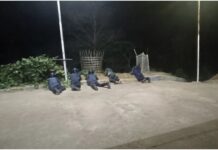Questions have been raised about the effectiveness of the government’s seven-day restrictions to curb corona infections. Many of the instructions are vague. In many parts of the world, lockdown is declared to prevent transmission of the virus and everything remains shut. But here the government is keeping some establishments open and some closed. Lockdown may not be possible in a country with a large population like Bangladesh.
The government has said that both life and livelihood must be protected. In that case life will get priority. It would be a great achievement if the rate of infection and death could be brought under control through the restrictions that have been imposed. But for that, the government has to take realistic initiatives and look at the issue in a holistic manner. Scattered steps will do no good.
In a country where about one-fourth of the population still lives below the poverty line, with 80 per cent of the total working population working in the informal sector, maintaining a livelihood balance is not only difficult, but extremely difficult. It is important to consider what will happen if the source of income of the poor is blocked. It is impossible to enforce restrictions without taking any measures regarding their livelihood. Low-income people and workers have protested against the restrictions. Hawkers and small traders from different areas including New Market have taken to the streets demanding the opening of shops. Earlier, motorbike riders also protested against the ban on ride-sharing.
The allocation made by the government for the marginalised people during the last general holiday did not reach them properly. No matter how short the lockdown is, people who suddenly lose their source of income need to be fed. Fighting hunger is no less important than surviving corona. There is no alternative to ensuring financial assistance for the poor. Financial assistance should be ensured on an urgent basis by compiling a list of the poor with the help of local governments. A mobile telephone number is enough to draw up a proper list.









